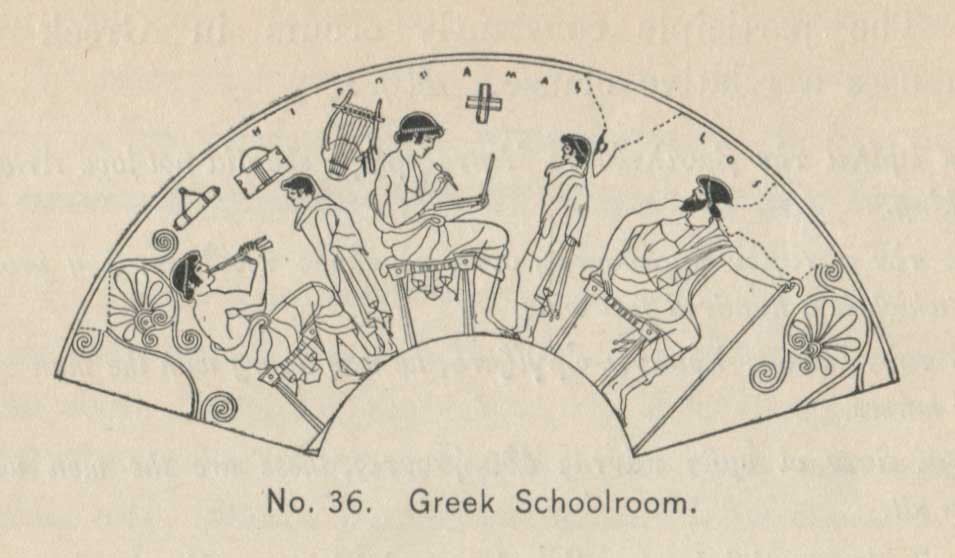THE FIRST GREEK BOOK
BY JOHN WILLIAMS WHITE, PH.D, LL.D., LITT.D.
Professor Of Ancient Greek At Harvard University
This Revision Copyright ©2012 by Shawn Irwin
Lesson LI - Stems in ι and υ of the Consonant Declension
S476. Learn the declension of πόλις, city,
πῆχυς, forearm, ἄστυ, town, and ιχθύς, fish, in 748.
S477. Vowel stems add ν in masculines and feminines to form the accusative singular.
Most stems in ι and a few in υ have
ε in place of their final ι or υ
in all cases except the nominative, accusative, and vocative singular, and have ως for
ος in the genitive singular, but ως, although long, does
not affect the accent. The genitive plural follows the accent of the genitive singular.
S478. VOCABULARY.
ἀκρόπολις, εως, ἡ (ἄκρος + πόλις), upper city, citadel, acropolis.
ἄστυ, εως, τό, town.
δόρυ, ατος, τό, spear shaft, spear.
δύναμις, εως, ἡ, ability, power, troops.
ἐξέτασις, εως, ἡ, review.
ἰχθύς, ύος, ὁ, fish.
λόγχη, ης, ἡ, spear point, spear.
πεντεκαίδεκα, indeclinable, fifteen.
πῆχυς, εως, ὁ, forearm, cubit.
πόλις, εως, ἡ, city, state.
Σάρδεις, εων, αἱ, Sardis.
τάξις, εως, ἡ, (compare τάττω), arrangement, order, array, division.
S479.
1. τὴν τοῦ στρατεύματος τάξιν ἐθαύμασεν.
2. οὗτος ἐπολέμησεν ἐμοὶ ἔχων τὴν ἐν Σάρδεσιν ἀκρόπολιν.
For the case, see 864.
3. ὁ ποταμὸς ἐστι τό εὖρος πλέθρου,
πλήρης δ᾽ ἰχθύων.
Accusative of specification (834).
Predicate genitive of measure (843).
The genitive follows πληρης (855).
4. ἔστι δὲ καὶ βασίλεια ἐπὶ ταῖς τοῦ ποταμοῦ πηγαῖς ὑπὸ τῇ ἀκροπόλει.
5. παρὰ ταύτην τὴν πόλιν ἦν γήλοφος.
6. ἐν τῷ τῶν Ἀθηναίων ἄστει ἦν ἀκρόπολις καλή.
7. εἶχον δὲ οὗτοι καὶ δόρυ ὡς (about) πεντεκαίδεκα πήχεων λόγχην ἔχον.
Attributive genitive of measure (841, 5).
8. Κῦρος δ᾽ ἐξέτασιν ποιεῖται τῶν Ἑλλήνων καὶ τῶν βαρβάρων ἐν τῷ πεδίῳ περὶ μέσᾱς νύκτας.
9. σὺ δὲ, ὦ σατράπη, τήν τε Κύρου δύναμιν καὶ χώρᾱν ἔχεις καὶ τὴν σαυτοῦ ἀρχὴν σῴζεις, ἡ δὲ
Ἀρταξέρξου δύναμις σοι σύμμαχός ἐστιν.
The adjective. See the general vocabulary.
S480.
1. He had garrisons in the cities.
2. There are fish in these rivers.
3. For Cyrus sent the tributes from these cities.
4. There he made a review and enumeration of the Greeks.
5. If you make use of the Greek force, you will easily conquer these barbarians.
S481. Treacherous Proposal of Orontas.
ἐντεῦθεν δ᾽ ὡς (as) ἐπορεύοντο, ἐφαίνετο
ἴχνη ἵππων˙
εἰκάζετο δ᾽ εἶναι ταῦτα ὡς (about) δισχῑλίων ἵππων. οὗτοι
ἔκᾱον καὶ χόρτον καὶ εἴ τι ἄλλο χρήσιμον ἦν. Ὀρόντᾱς
δὲ, Πέρσης ἀνήρ, γένει τε προσήκων τῷ Ἀρταξέρῃ καὶ
τὰ πολέμια λεγόμενος πάνυ ἀγαθὸς εἶναι, ἐπιβουλεύει
Κύρῳ. οὗτος ἔλεξεν ὅτι εἰ αυτῷ Κῦρος ἐπιτρέψειεν
ἄνδρας χῑλίους ἠ τοὺς πολεμίους κατακόψειεν ἂν ἢ αὐτοὺς
ἂν κωλύσειε κάειν τὸν χόρτον.
From the camp opposite Charmande. See the map.
There kept appearing, imperfect (68).
A predicate genitive of possession (843).
Refers to the horsemen implied in ἵππων.
whatever else.
in matters pertaining to war, an accusative of specification (834).
Present passive participle, being said or reckoned.
κτλ: Orontas said: εἰ ἐμοι ἐπιτρεψειας ἀνδρας χιλιουςἠ τοὺς πολεμίους
κατακοψαιμι ἂν ἠ αὐτους ἂν κωλύσαιμι κτλ. (364).

See the route on the map.
End Of Chapter
INDEX
Chapter 52
HOME
This Revision Copyright ©2012 by Shawn Irwin
